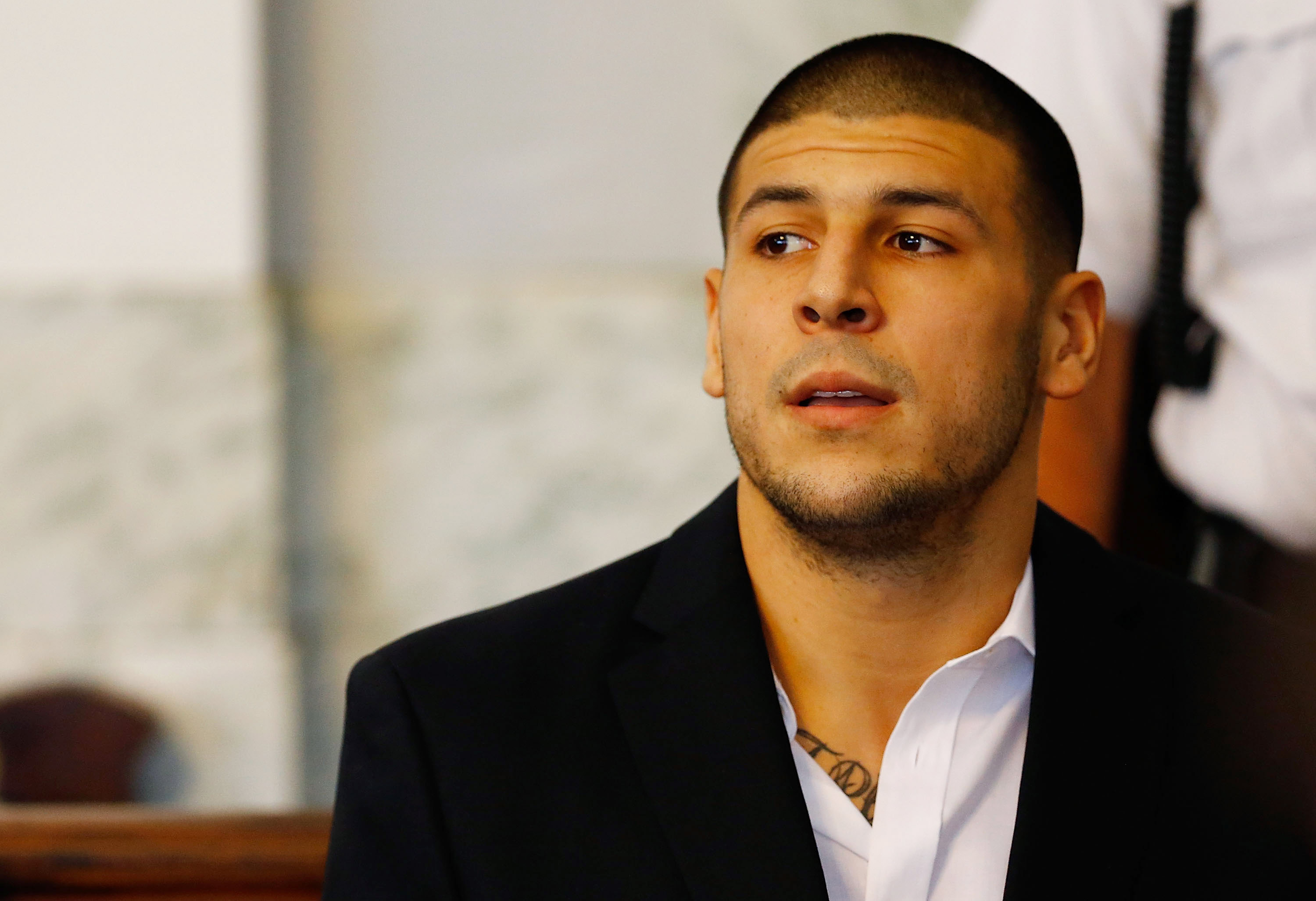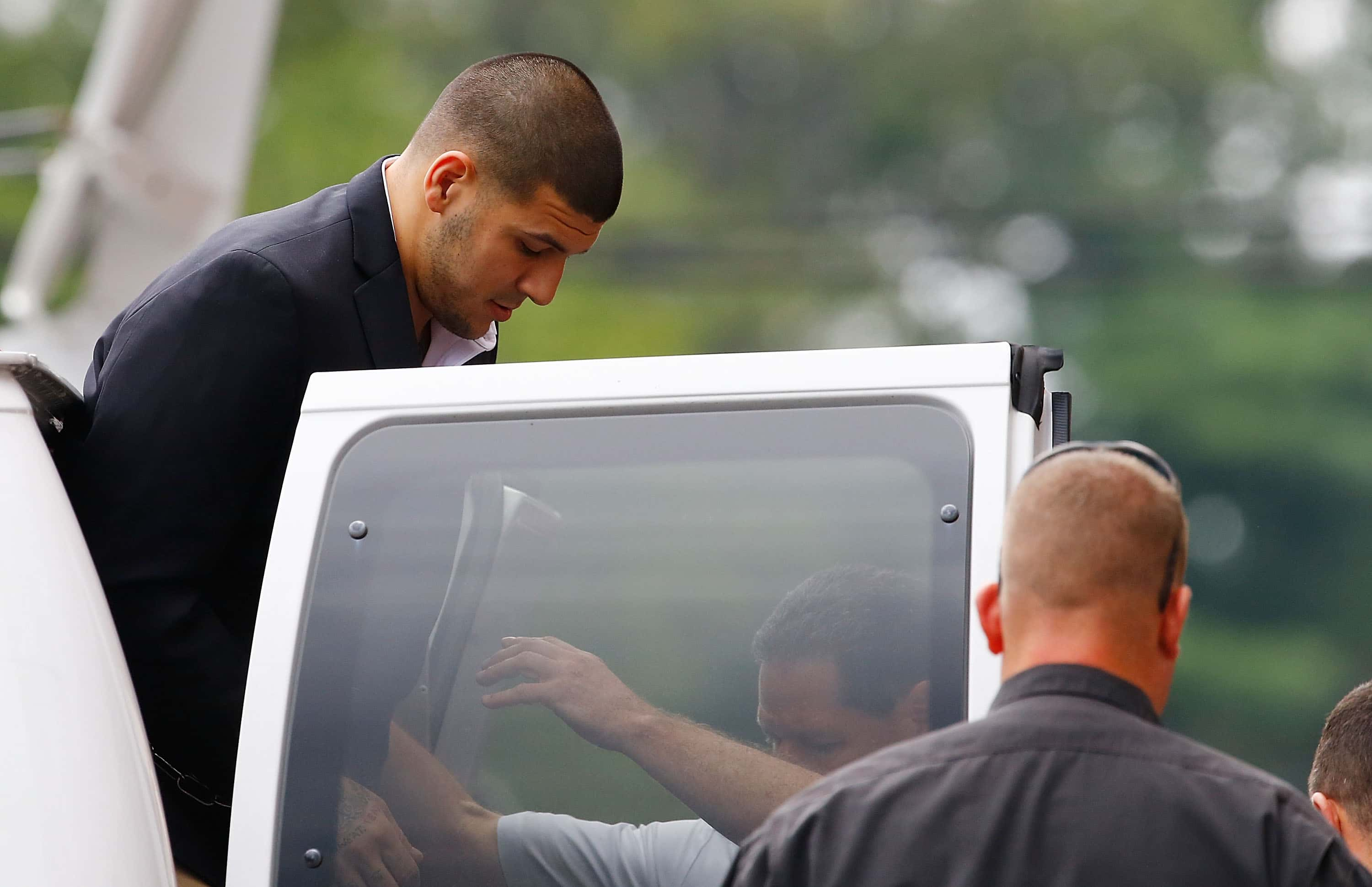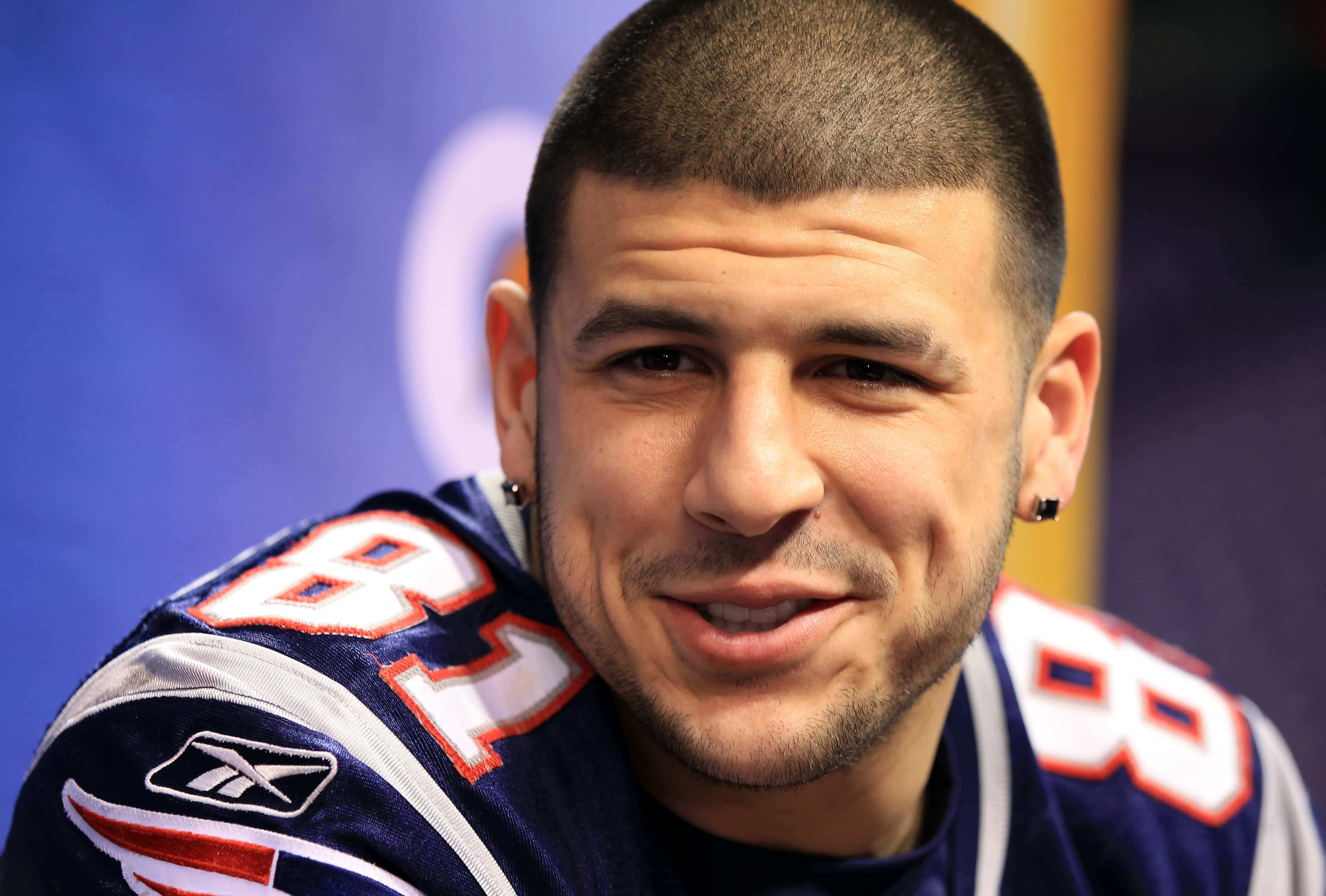Two years after Aaron Hernandez's death, new documentary tries to answer why the young NFL star killed himself in prison

The youngest National Football League player in 2010, Aaron Hernandez, a multimillionaire father-of-one, was riding the wave of success when it all came crashing down after he allegedly took the lives of three people, and eventually his own. Hernandez was found guilty of first-degree murder in 2015 after he shot and killed Odin Lloyd, the boyfriend of his fiancée’s sister. Two years later, on April 19, 2017, Hernandez was found dead in his prison cell at the age of 27. Hernandez had been serving a life sentence when he took his life by hanging himself.
Hernandez, who grew up under the strict regimen of his athlete father, always received good grades in school, was adored by others and was considered a hard worker. He was at the peak of his success at age 22 in 2012 Super Bowl. With a promising future ahead, Hernandez's suicide left multiple unanswered questions, with the most pressing being: Where did it all go wrong for him? Reelz documentary 'Autopsy: The Last Hours of… Aaron Hernandez', with the help of world-renowned forensic pathologist, Dr. Michael Hunter, explores some possible reasons that could have driven one of the most exciting prospects in the history of the NFL to end it all.
Grief
Hernandez had a very special relationship with his father, Dennis Hernandez. His father's disciplinarian attitude towards his fitness and game led to the football talent's eventual success. However, when Hernandez was 16 and studying at Bristol Central High school in 2006, he became despondent with grief after hearing that his father had passed away. With no father figure to guide him, the teen began losing his sense of direction, and eventually, he became a changed person. His relationship with his mother had impaired after she began having an affair behind his father's back. Ever since, his mother continued to move in and out of his life.
Hernandez, in 2009, revealed that he was unable to cope with his father's demise. Dr. Hunter, in the documentary, concludes that as a teen, the football player's natural grieving process was derailed, causing suicidal tendencies, which eventually led him to take his own life.

Chronic Traumatic Encepolothopy
It was revealed after his death that Aaron Hernandez was suffering from advanced Stage 3 Chronic Traumatic Encepolothopy (CTE), which is a progressive neurogenerative disease common in athletes. According to Hunter, CTE patients have difficulty controlling their impulses, display aggression, emotional volatility, and rage. The pathologist suggested that Hernandez may have also been genetically predisposed to the condition, which highly affected his brain, even shrinking it.
Results showed that Hernandez had the worst case of CTE ever seen in someone his age. His resulting ailments like a lack of impulse control and rage could have had a part to play in him shooting down Lloyd and allegedly others.
His first violent streak was noted in April 2007, when he was partying with his fellow footballers from the University of Florida. He was reportedly served some drinks and he told the waiter he hadn't ordered them. While leaving, the manager stopped him, asking him to pay the due bills and that is when Hernandez unfurled: he punched the manager, rupturing his eardrum, according to the documentary. No case was registered in the incident. A year later, he also opened fire at a chain snatcher, that story never made the news.
A psychological profile created of the player by the NFL in 2009 also raised major questions about his mental health. He reportedly scored 1/10 on social maturity, was not happy, unpredictable, and had mood changes. His anger was also a cause of concern.
Hunter, in the film, says: "CTE is key to his [Hernandez's] demise."

Drugs
Hunter also points to Hernandez' constant drug use as reasons behind further degeneration of his cognitive abilities. Hernandez was a regular marijuana user, and used to smoke nearly an ounce a day, according to his friends in the documentary. He was also allegedly using Phencyclidine (PCP), also known as fairy dust. Hunter states that marijuana, in combination with PCP could have damaged his brain as the drugs can hinder a person's perception and judgment.
Before shooting Lloyd in 2013, Hernandez had allegedly also shot and killed Daniel de Abreu and Safiro Furtado in 2012. According to his friend Alexander, Hernandez was partying out when one of them bumped into him and spilled his drink. The player was enraged but was asked by Alexander to leave the venue instead of instigating a fight. Hernandez and Alexander were driving in their car when they saw Abreu and Furtado at a traffic light. Hernandez allegedly opened fire on them, unloading his weapon. He would not be linked to the deaths until after his conviction for Lloyd's murder. He was eventually found not guilty of the duo's murder.
At the time of the alleged shooting on Abreu and Furtado, Hernandez was using PCP, which according to Hunter, could have induced paranoid delusions in him.
"Aaron thought everybody was a detective," Alexander said in the documentary. The film also sheds light on his impulse control citing the crime scene in Lloyd's murder. The player's DNA and other related clues were all over the crime site, meaning he had not given a thought to the murder prior to the act as he left incriminating evidence behind. He acted out of a violent impulse.

Prison factors
Hernandez, after his conviction, went from living in a 7,000 sq ft home to a 70 sq ft prison cell. Stationed at Souza — Baranowski Correctional Center, Shiplap, MA, Hernandez spent 21 hours a day locked in 7/10 foot cell. In prison, the athlete got only one hour per day to exercise, leading to an impact on his physical and mental health. He transformed, from being at the peak of his health to weight gain. Dr. Hunter explains that lack of endorphins due to an absence of regular exercise could have resulted in anxiety and depression in the player. During a routine check, a sharpened metal was also found in his cell, suggesting his need to be protected in a cell filled with violent criminals. The constant need to feel protected cold also have led to constant stress and pushed him towards negative thoughts.
The player had also become increasingly religious in prison. Hernandez hanged himself just five days after he was cleared of Abreu and Furtado's death. He had also appealed his life sentence in Lloyd's murder. He called his fiance 7 hours before his death, and no one detected any signs of depression. His behavior appeared normal. When he died, there was John 316 written across his forehead with red ink, he cut his middle finger, let blood drip on the specific Bible verse, and wrote Illuminati on his cell wall with blood. He had reportedly told his inmates: "When you die, your soul gets reincarnated." Hernandez also jammed his cell door and threw shampoo across the floor to restrict efforts of rescue attempts.

Homosexuality
The documentary also explored the rumors of Hernandez possibly being gay. He was allegedly in a long-term relationship with his high school classmate, who visited him more often in prison that his fiance. Prison inmates had allegedly heard him listening to a radio show with links to homosexuality. The film suggests that Lloyd could have known about his sexuality and the fear of being outed could have driven him to kill him. However, close friends disagree with the theory as they say Hernandez made loving bonds with everyone he knew, and they were absolutely certain that he wasn't gay.
Legal Abatement
Hernandez, during the two years of his prison stay, had become aware of a clause which stated that if he died while his appeal was still pending, he could die an innocent man, suggesting absolvement of his sins, according to a prison investigation. This could have been an important factor in the star player's death. According to the film, he also left a suicide note behind, where he mentioned in a sentence referring to his fiance "you're rich" as he left behind $6 million for her to inherit.
If you or someone you know is considering suicide, please contact the National Suicide Prevention Lifeline at 1-800-273-TALK (8255)










